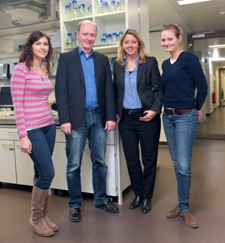Cellular mechanisms

Current research in respiratory medicine aims at understanding cellular and molecular mechanisms underlying lung diseases. In this context, the research team developed novel, chip-based assays that enable in-depth phenotyping of immunological processes at single cell level. These novel cytometric assays are comprised under the name „chipcytometry“. Chipcytometry allows for high-content and precise cytometry of cell culture, blood, cerebral fluid, or BALF, and from tissue sections.
For Chipcytometry, cells or tissue-cryosections are fixed on an adhesive layer and placed in microfluidic chips. Surface or intracellular markers can be stained iteratively using fluochrome labeled antibodies with intermittent bleaching or quenching procedures. Samples can be stored for more then one year and restained and further analyzed during this time.
In this project, Chipcytometry is used for the examination of patients with bronchial asthma to identify phenotype-specify components and complex cellular phenotypes of the adaptive human immune system. Within the Hannover Medical School, Chipcytometrie is a technology development which is exclusively available for selected project partners. Within the BREATH consortium, in-depth chipcytometricphenotyping of BALF cells of asthmatic patients is ongoing (DZL-KIRA study).
Scientific Head:
Prof. Dr. Gesine Hansen
Cooperating Partners within the DZL: Biomedical Research in Endstage And ObsTructive Lung Disease Hannover (BREATH), Comprehensive Pneumology Center (CPC) Munich, Universities of Giessen and Marburg Lung Center (UGMLC)